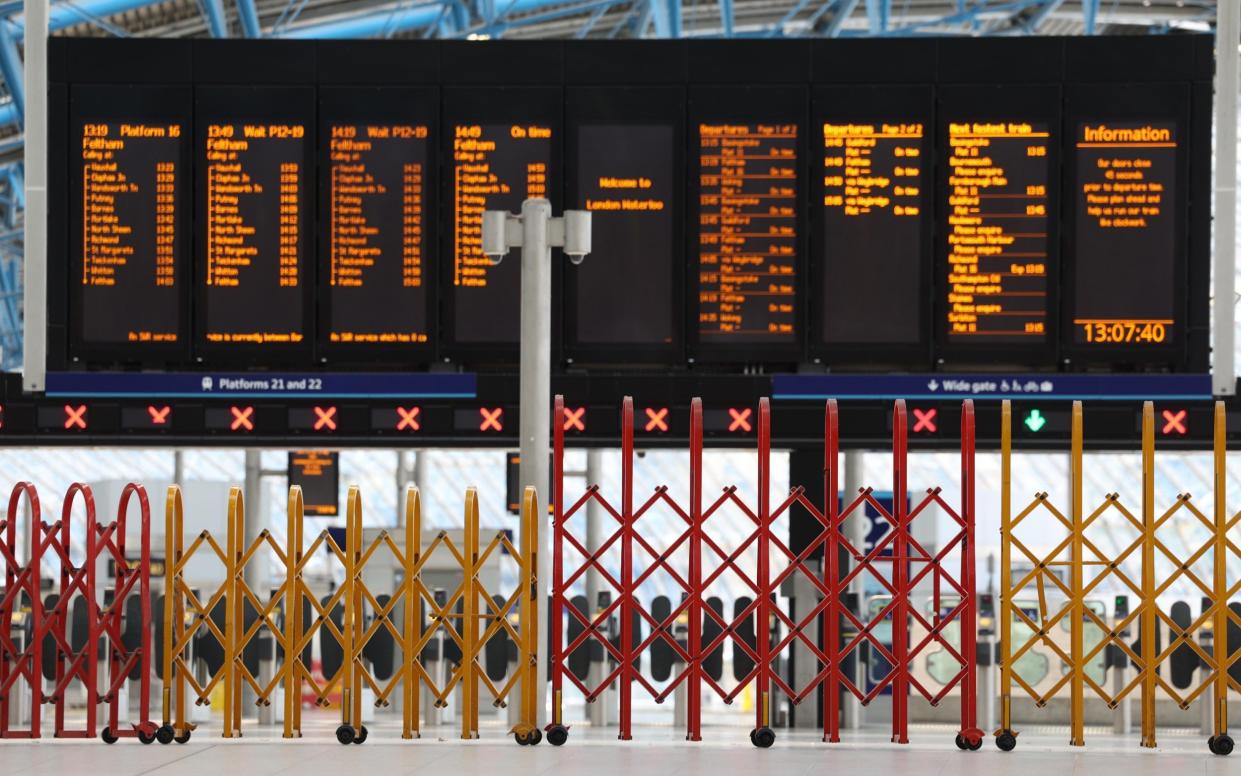These rail strikes are just a taste of life under Labour

The service will always arrive on time. You may even get a seat. Fares will be “simpler”. There might even be a decent sandwich for less than a fiver, and of course, most of all the strikes will come to an end.
When Sir Keir Starmer outlined his plans for Great British Rail last month he gave the impression that a return to state ownership would usher in a new golden age of travel.
But hold on. It turns out that the bulk of the strikes that have thrown the system into chaos this week, and made commuting near-impossible, are against rail companies that have already been nationalised. In reality, switching Labour’s strategy to “Get Britain Moving” will make the network even worse. This week’s strikes are just a taste of the chaos under a Labour government.
It has been yet another frustrating time for anyone struggling to get from one part of the UK to another. The union Aslef staged walkouts at 13 different rail companies including Great Northern, Southeastern, LNER, and Great Western.
In a series of rolling strikes and overtime bans, some of these firms have brought parts of the network to a complete halt, preventing commuters from getting to work, students from getting back to university, and disrupting spring bank holiday travel.
Rail has become a haphazard, unreliable form of transport. No one can be certain which trains were running on what days, and the strikes are fast approaching their second anniversary with no end in sight. Even if a pay settlement is eventually reached, the drivers may well find some fresh grievance to start them up again.
Against this backdrop, you can see the temptation for Labour to argue its plans will alleviate the current woes. After all, with Great British Rail owned by the “people”, the drivers and other staff will no longer suffer exploitation by rapacious capitalist bosses.
Instead, they will be working for the “public good”, while ministers plan the long-term investment needed to deliver the best possible rail system, and make sure the staff and passengers are treated fairly. With the private sector out of the way, everything will function as it should.
There are a few small issues with this argument, however. The bulk of the strikes this week involve companies that have already been taken back into state ownership.
Northern, Southeastern, Welsh Railways, the Transpennine and Northern are all now fully owned by the Government. Even ScotRail, which is not just publicly owned, but is run by the liberal and progressive SNP administration, has been plagued by strikes. In short, industrial relations are just as bad when ministers are in charge of the network as when private shareholders are.
This shouldn’t come as a surprise. In fact, walkouts are far more common under state ownership. In the early-1970s, more than 22 million days were lost to industrial action at a time when the state controlled whole swathes of British industry, including the mines, steel factories, telephone system, car industry, an airline, as well as the train network. The larger the role of the state, the more fractious the relationship between workers and management.
Even now, trade unionism is largely concentrated in the public sector, with 48pc of state employees belonging to a union, compared with 12pc of private sector workers.
Nationalised industries tend to have more powerful unions – and let us not forget Labour intend to strengthen them further - which makes strike action more likely.
What’s more, public sector strikes can often be more effective: while private sector bosses are typically motivated by delivering a profit to their shareholders, ministers are often preoccupied by bad headlines, and keeping the voters happy.
Far easier, therefore, to simply give in to the strikers, get the network running again, and then let the chancellor worry about how to pay for it all down the line. And, of course, that’s before you get to the cost of buying out the Rolling Stock Operating Companies, as would be required for full-scale renationalisation.
The chaos we have witnessed over the last two years might be frustrating, but the conclusion that it is going to get a lot worse under a Labour government is hard to avoid.
Most of the companies hit by industrial action this week have already been nationalised, and those that have not yet been taken back under state control are already tightly regulated, and are left with almost no freedom to make their own decisions. And they are already massively subsidised by the taxpayer (the same people, as it happens, who are also paying sky high fares as they struggle to commute into the office).
Labour pretends that its plan for Great British Rail will solve all the network’s problems, and exasperated voters might want to believe it.
But lessons from the past – and present – ought to be heeded. When the Government offered 4pc pay rises two years in a row, Aslef described it as “risible”. Industrial action on the railways has a long history: the first recorded strike was in 1842.
The Tories have failed to address union militancy, but does anyone think Labour will do any better? The unions will sense the weakness, and make more and more extravagant demands. A Starmer administration could simply give in, but money will be too tight to throw huge resources at the railways. In the end, it’s the passengers who will suffer.


